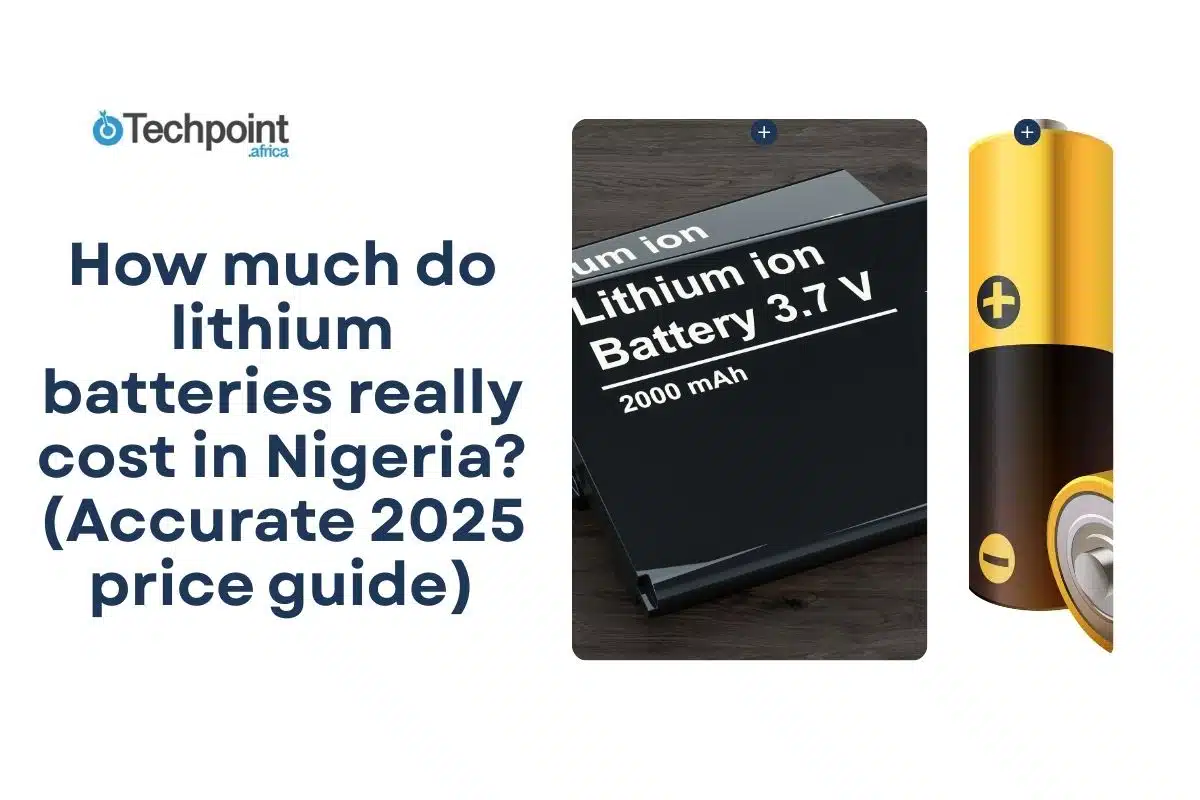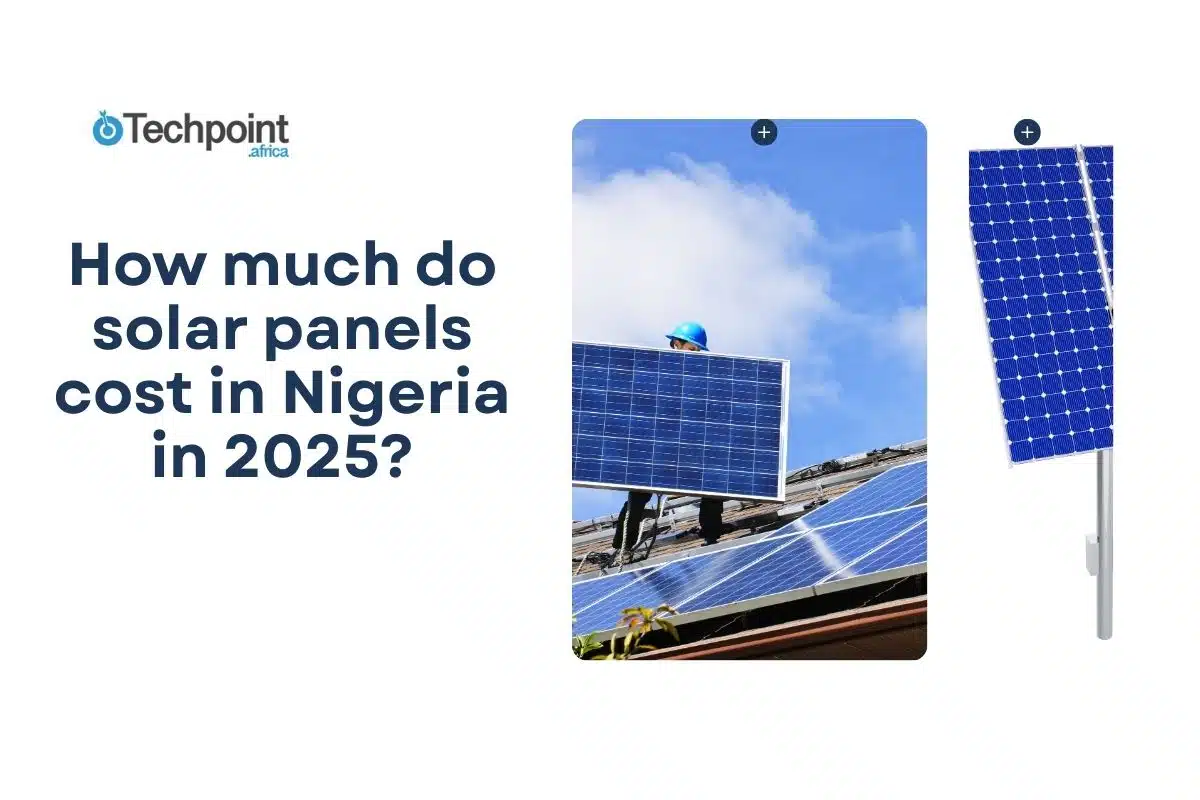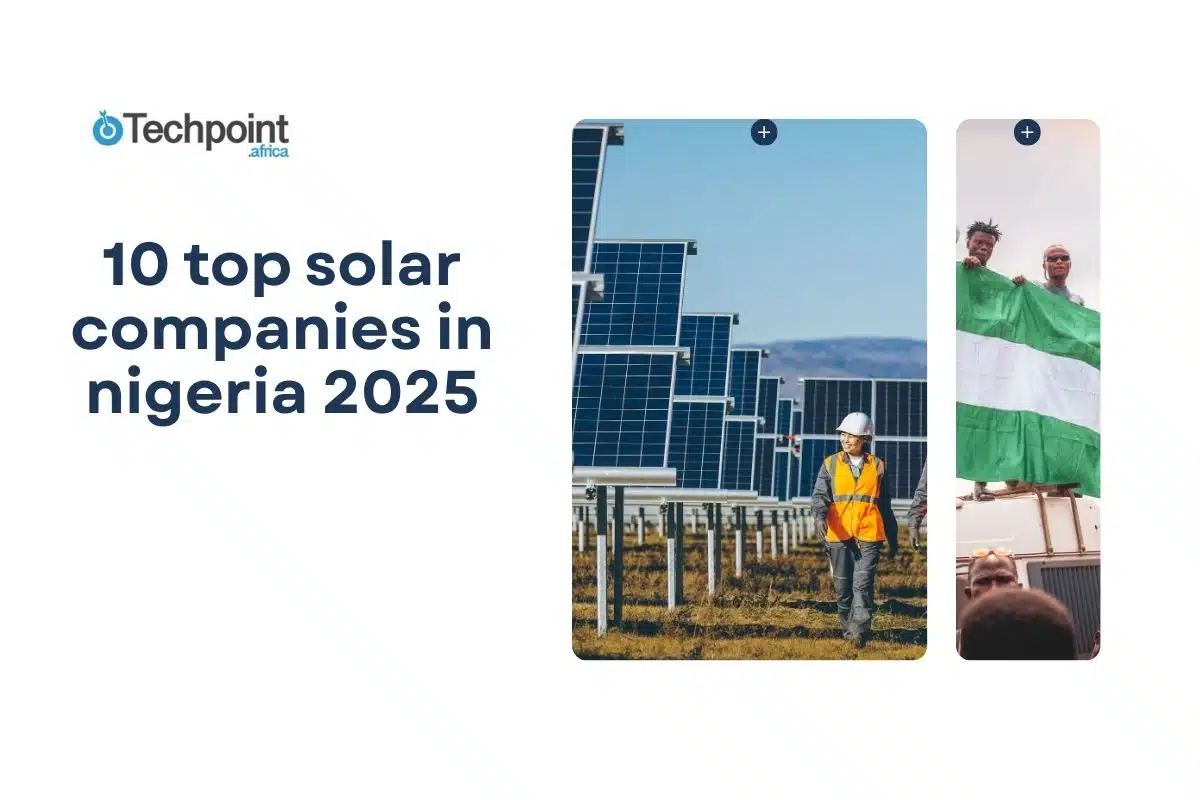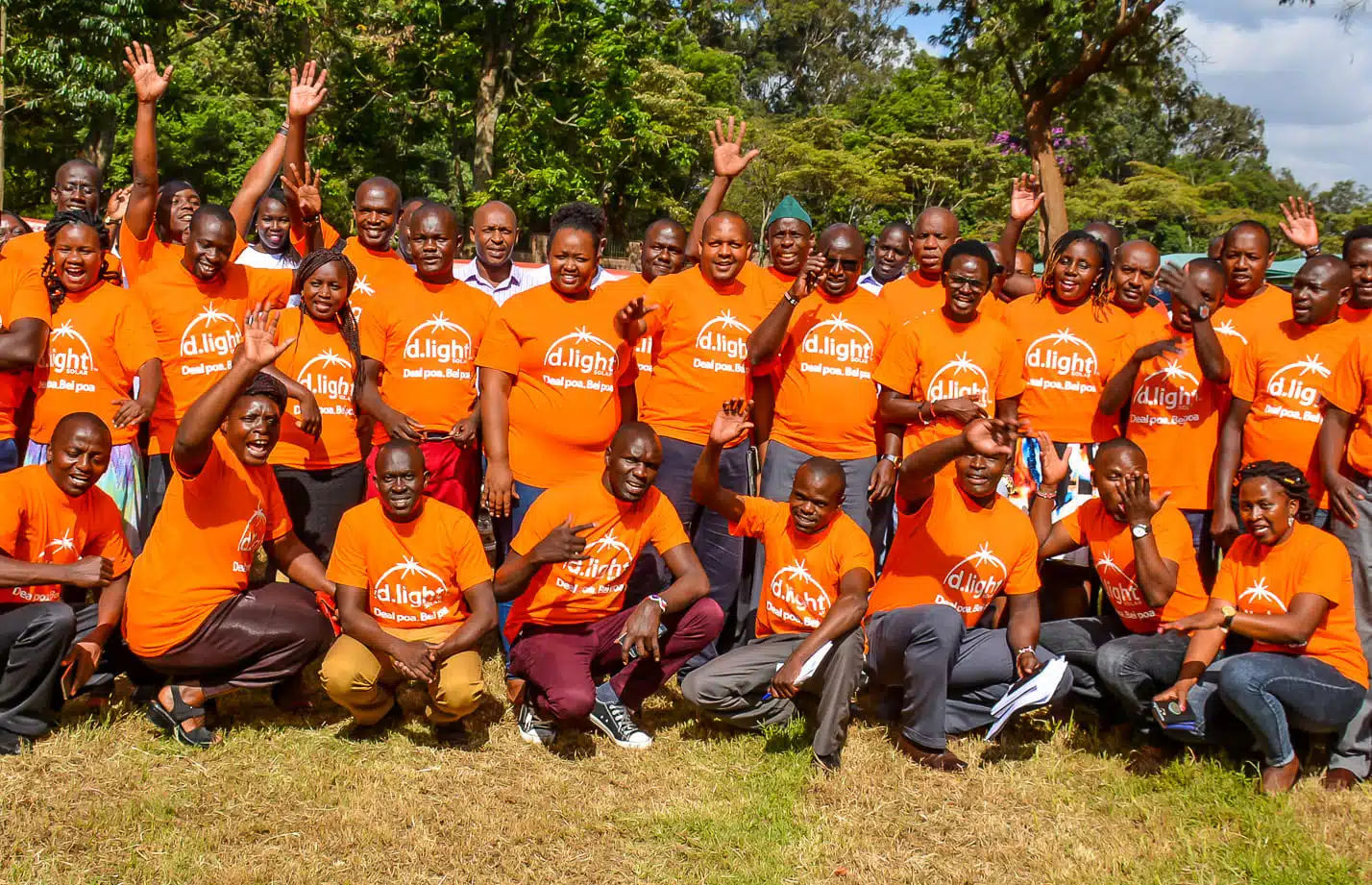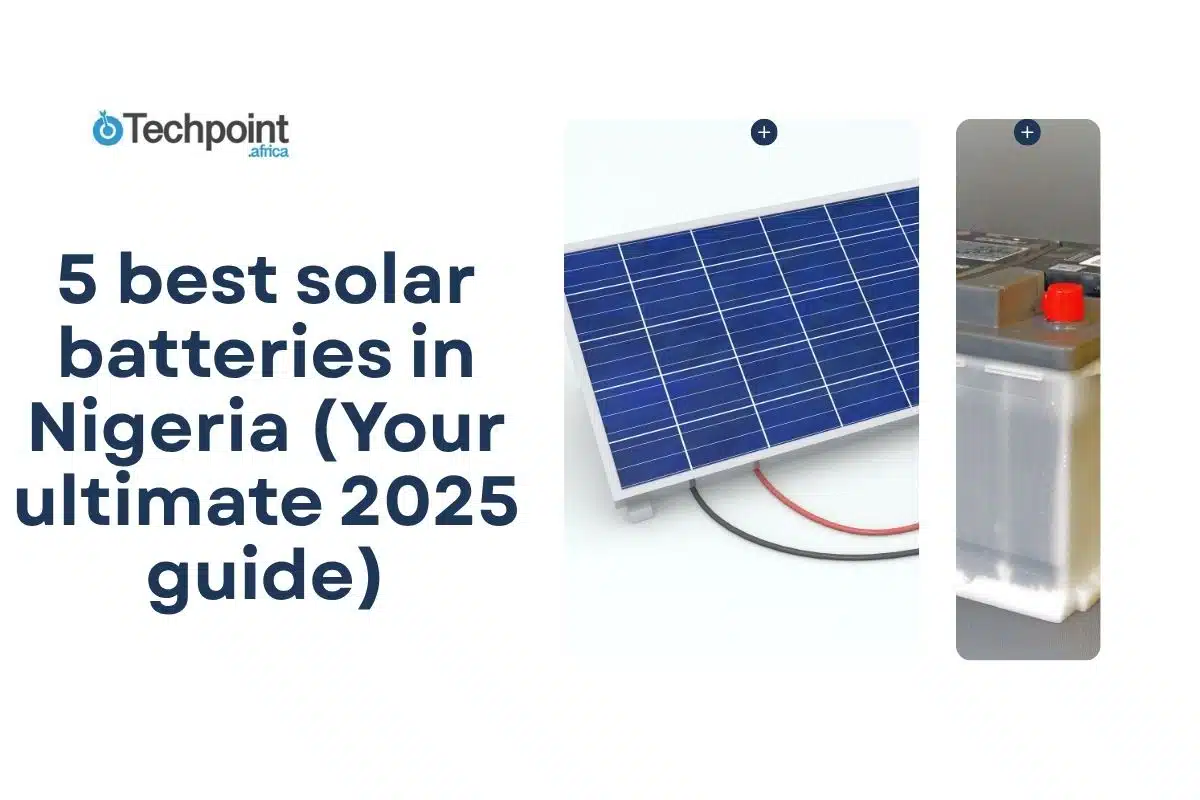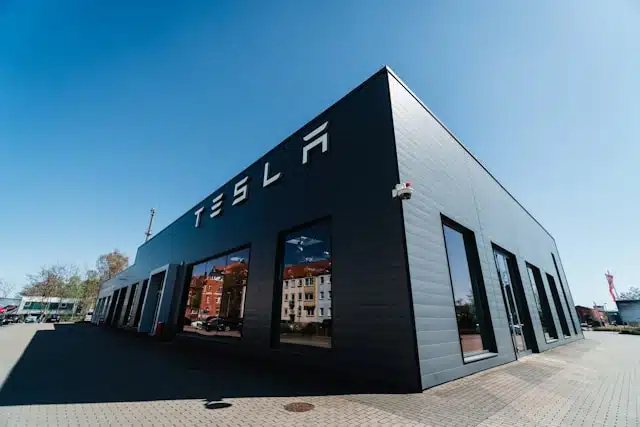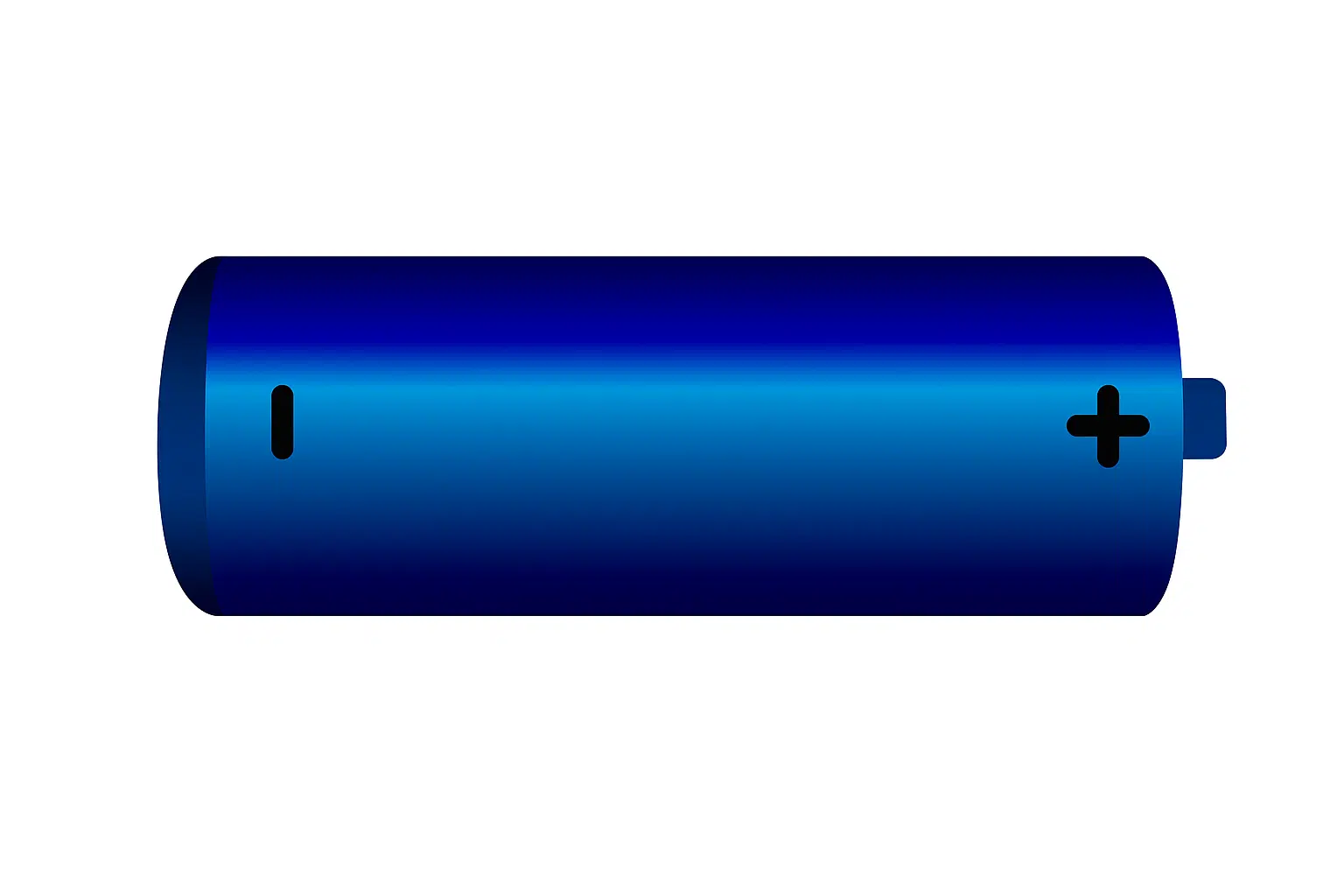
If you’ve ever tried getting a lithium battery in Nigeria, you’d have noticed how bent the figures are. When I say “ the figures,” I mean accurate prices. One seller or platform would set theirs for 1.6 million naira while the other set it for 900,000, causing your mind to swirl into confusion, wondering what’s real. Who’s trying to rip you off?!
That’s why we made this guide to clarify those thoughts.
We didn’t just copy and paste prices from outdated blogs or rely on AI-generated summaries. We went straight to verified platforms like Jiji, Energymall, Solar Village, Maypatronic, Grecopower, and more, collecting real 2025 prices across different battery brands and capacities.
Whether you’re powering a one-bedroom flat or running a full hybrid solar system, this guide shows you what to expect, what’s fair, and where the real value lies. You’ll see charts, price tables, and smart tips to help you avoid cash wastage and purchase disappointment.
If you’re investing in backup power this year, read this before you buy that lithium battery. And if you already did but didn’t get the satisfaction you wanted, this is the price guide you wish someone had given you earlier.
Let’s get into this goodness!
How our experts collected these lithium battery prices
To provide you with an accurate view of how much lithium batteries cost in Nigeria right now, we gathered actual prices from verified sellers and trusted platforms, not outdated blog lists or guesswork. Every price shown in this article was cross-checked and grouped carefully, with attention to accuracy and current market activity as of June 2025.
Here’s how we did it:
Jiji.ng was one of our primary sources for current battery prices. We checked verified listings with complete product descriptions, seller history, and active profiles for 5kWh and 10kWh lithium batteries across different brands like Felicity, Blue Carbon, and Sako.
We also sourced prices from Energymall.ng, a well-known e-commerce platform for solar and energy products. Energymall provided detailed pricing for brands like Gennex, Felicity, and Blue Carbon, often listing multiple capacity options per brand.
Grecopower.com.ng was used for its consistent updates on premium battery models. This site gave us applicable pricing for Felicity 10kWh and Blue Carbon 15kWh batteries.
SolarVillage.africa was another helpful source, particularly for mid-range batteries from brands like SRNE, Sako, and Blue Carbon. Their listings were cleanly organized and often included specs like voltage and warranty.
We reviewed listings on Maypatronic.com, where we found additional pricing for high-capacity Felicity models and Blue Carbon batteries. Maypatronic helped fill in the gaps between the highest and lowest market prices.
Dirigible.com.ng and Innovateenergy.com.ng were also checked for specific models of Sako and SRNE batteries, respectively.
Other sources included Pragmarstore.com, Thrillhouse.com.ng, and Jumia Nigeria, especially for cross-verifying SRNE prices across multiple vendors.
Lastly, in cases where a battery appeared across three or more platforms, we calculated the average price and formed a chart to reflect what a buyer can realistically expect to pay, balancing out the high and low ends of the spectrum. This method ensures you’re not just seeing isolated prices but a realistic price range from the Nigerian battery market today.
In simpler terms: We didn’t guess the prices or pick the cheapest one. We used multiple real listings, calculated the average, and made you a price trend reflecting the Nigerian market, not only one seller’s offer.
Current lithium battery prices in Nigeria 2025
Lithium batteries in Nigeria are not one and the same; some sellers or platforms offer slightly lower or higher prices depending on the brand, warranty, or delivery options. That’s why you’ll sometimes see various prices for the same battery.
The prices for each battery model in the tables below are not estimated but pulled directly from multiple trusted platforms like Jiji.ng, Jumia, Energymall, Grecopower, and others. We included prices from these different sellers to see what’s available across the market.
This helps you understand what’s fair and expensive and what kind of deal you might find if you go shopping.
Disclaimer: The prices listed in this article are based on publicly available listings from trusted Nigerian platforms as of June 2025. While we’ve done our best to ensure accuracy, battery prices can change frequently due to market conditions, location, exchange rates, or seller availability.
We strongly recommend you confirm the current price directly with the seller or platform before making any purchase or financial commitment.
Felicity lithium battery prices
| Model / Capacity | Voltage (V) | Condition | Price & Source (₦) | Price & Source (₦) | Price & Source (₦) | Notes |
| Felicity 3.5kWh Lithium | 24 | Brand New | ₦610,000.00 — from Felicitysolar.ng | ₦617,550.00 VAT Inc — from Grecopower.com.ng | ₦ 850,000 — from Jiji.ng | LiFePO4, 5-year warranty. |
| Felicity 5kWh 100AH Lithium Battery | 48 | Brand New | ₦1,438,000.00 — Felicitysolar.ng₦1,736,000.00 —from Grecopower.com.ng | ₦1,400,000— from Jiji.ng₦1,451,562—from Energymall.ng | ₦1,620,000— Jumia.ng₦1,550,000.00 _— from Maypatronic.com | Popular for homes & businesses. |
| Felicity 10kWh 200AH Lithium Battery | 48 | Brand New | ₦2,702,000.00 —from Felicitysolar.ng₦3,024,000.00 —from Grecopower.com.ng | ₦ 2,450,000 — from Jumia.ng₦ 2,150,000—from Jij.ng | ₦2,250,000.00 —from Maypatronic.com₦2,054,812 — from Energymall.ng | High capacity, solar compatible. |
What to expect if you buy the Felicity 3.5kWh (24V) lithium battery
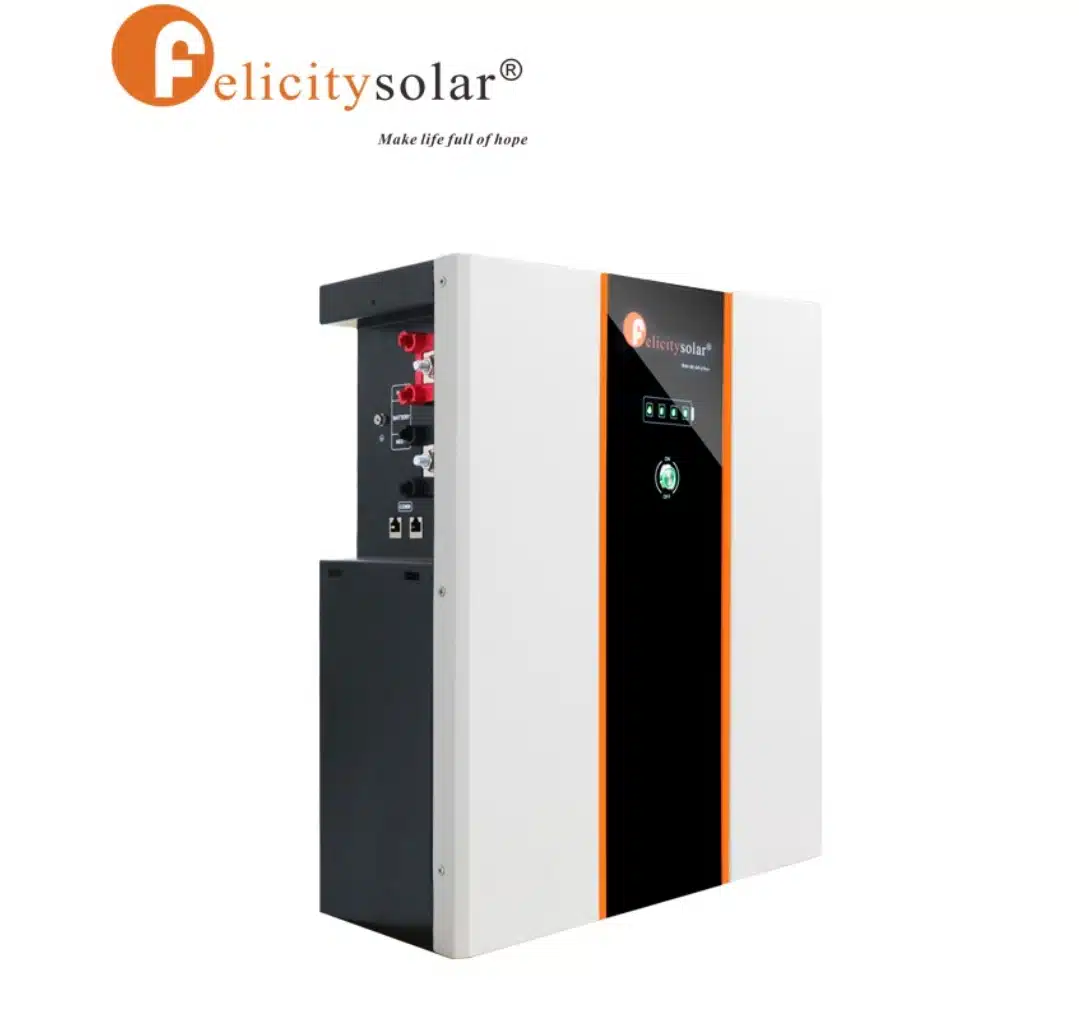
- LiFePO₄ chemistry with a 5-year warranty for long-term reliability.
- Compact and suitable for basic household loads like lighting and electronics.
- Built-in BMS protects against overcharging, over-discharging, and high temperatures.
- Can be connected in parallel to increase total system capacity over time.
What to expect if you buy the Felicity 5kWh 100Ah (48 V) lithium battery
- LiFePO₄ build ensures better safety, longer cycle life, and energy density.
- A go-to option for homes and small businesses, stable daily backup.
- Integrated smart BMS for voltage, temperature, and load regulation.
- Designed for rack or floor mount setups with scalable parallel support.
What to expect if you buy the Felicity 10kWh 200Ah (48 V) lithium battery
- High-capacity unit designed for full solar systems and hybrid inverter setups.
- Built-in communication ports (CAN/RS485) for inverter compatibility and monitoring.
- Expected lifespan of around 3,000 cycles at 80% depth of discharge.
- Can be installed in parallel to expand battery bank capacity.
- Coverage of a 5-year product warranty and long-term manufacturer support.
Blue carbon lithium battery prices
| Model / Capacity | Voltage (V) | Condition | Price & Source (₦) | Price & Source (₦) | Price & Source (₦) | Notes |
| Blue Carbon 5kWh 200Ah Lithium | 24 | Brand New | ₦1,740,000.00— from Grecopower.com.ng₦1,650,000.00 — from Maypatronic.com | ₦ 1,350,000 —from Jiji.ng ₦1,199,000.00—from Solarvillage.africa | ₦1,170,950— from Energymall.ng | Mid-sized battery known for good value and availability. |
| Blue Carbon 15kWh 300Ah Lithium | 48 | Brand New | ₦3,226,000.00 —from Grecopower.com.ng | ₦3,250,000.00—from Maypatronic.com | 2,350,000—from Jiji.ng₦2,133,862—from Energymall.ng | Premium option for heavy users or larger installations. |
What to expect if you buy the Blue Carbon 5kWh (24 V) lithium battery
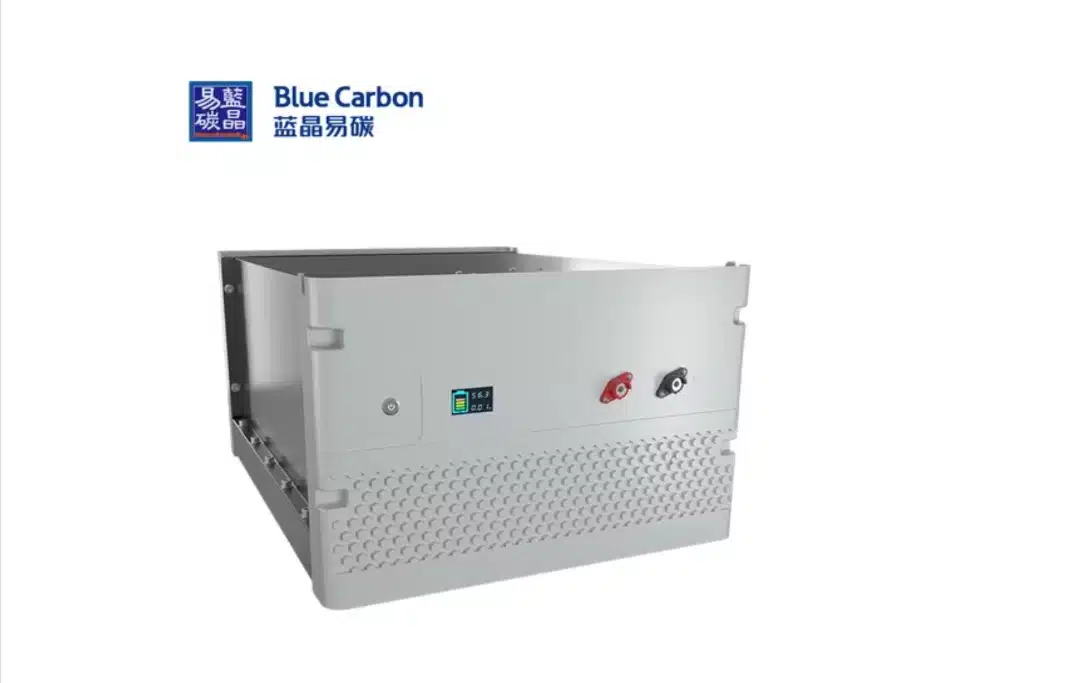
- 5kWh capacity suitable for medium-sized residential or office use.
- Smart BMS protects against common power issues and ensures stable performance.
- Often used in off-grid setups and is compatible with most solar inverters.
- Portable design with metal casing; typically wall or floor mountable.
- What to Expect If You Buy the Blue Carbon 15kWh (48 V) Lithium Battery.
- High-capacity lithium battery ideal for large homes, offices, or solar farms.
- Uses advanced LiFePO₄ cells with over 6,000 life cycles at 80% DoD.
- A heavy-duty smart BMS and deep inverter integration design.
- Excellent for setups requiring prolonged backup and extensive load support.
- Sturdy, rack-mount-friendly design with strong build quality and internal protections.
- Stipulated lasting timeframe of 10 years.
Gennex SVC lithium battery prices
| Model / Capacity | Voltage (V) | Condition | Price & Source (₦) | Price & Source (₦) | Price & Source (₦) | Notes |
| Gennex SVC 10kWh 200Ah Lithium | 48 | Brand New | ₦2,882,000.00 —from Gennextechnoligies.com | ₦2,900,000.00—from ipowerenergyhub.com | ₦2,869,941—from Energymall.ng | Long-lasting, locally trusted brand with full solar compatibility. |
What to expect if you buy the Gennex SVC 10kWh (48 V) lithium battery
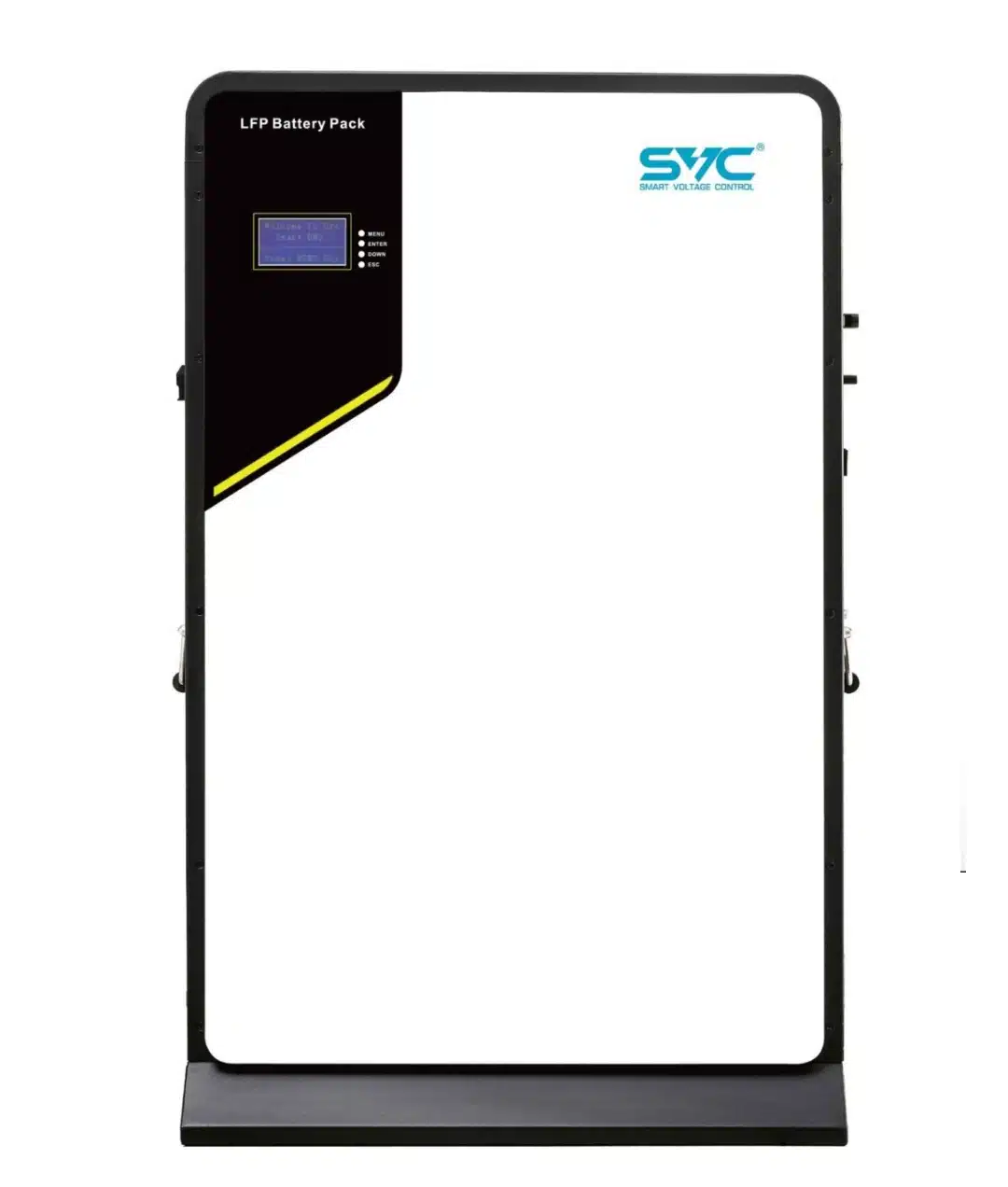
- Built with LiFePO₄ chemistry offering high safety, long lifespan, and thermal stability.
- Designed for floor mounting, with a compact and rugged metal housing.
- Designed for over a decade of use, with a robust service life.
- Expandable system architecture, supporting up to 16 connected units.
- Integrated smart Battery Management System (BMS) for real-time protection and health monitoring.
- Comes with RS-485/RS-232 communication ports to support inverter compatibility and remote management.
- Suitable for large residential setups, commercial buildings, and solar hybrid systems.
SRNE lithium battery prices
| Model / Capacity | Voltage (V) | Condition | Price Source A (₦) | Price Source B (₦) | Price Source C (₦) | Notes |
| SRNE 5kWh Lithium | 51.2 | Brand New | ₦ 1,476,000 from Jiji.ng | ₦1,579,000.00—from pragmarstore.com | ₦1,465,000.00 — from thrillhouse.com.ng | Compact design, decent performance for mid-tier budgets. |
| SRNE 10kWh 200Ah Lithium | 48 | Brand New | ₦3,100,000.00—from thrillhouse.com.ng | ₦3,215,000.00—from Solarvillage.africa | ₦3,250,000.00—from innovateenergy.com.ng | A high-end battery often used in professional solar installations. |
What to expect if you buy the SRNE 5kWh (48 V) lithium battery
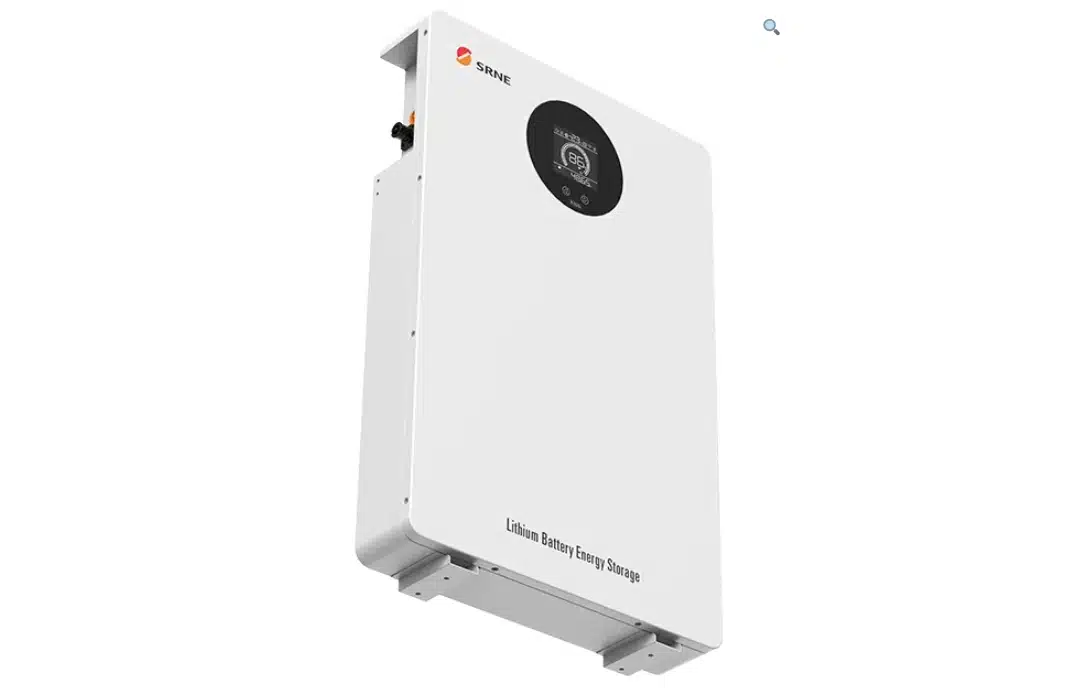
- Built with LFP (LiFePO₄) chemistry and designed to last up to 20 years under ideal indoor conditions.
- It offers 6,000 full cycles at 80% DoD, making it suitable for long-term daily use.
- Rated at 51.2V, 200Ah with 5kWh of usable energy — ideal for homes or hybrid solar systems.
- Equipped with a smart BMS that manages temperature, voltage, and current safely.
- Features CAN, RS485, and RS232 communication ports for easy integration with modern solar inverters.
- Supports up to 4 batteries in parallel, allowing system expansion for higher capacity needs.
- Passively cooled (natural convection) and protected in a sealed IP54-rated casing for dust and splash resistance.
- Stays stable across wide operating temperatures, with safe charge and discharge limits.
- Heavy-duty build (90kg) with a slim, floor-mountable form factor for residential installations.
What to expect if you buy the SRNE 10kWh (48 V) lithium battery
- It offers a generous 10.24kWh energy capacity, making it perfect for homes, small offices, and off-grid setups.
- Engineered for longevity with up to 6,000 charge cycles at 80% depth of discharge and a projected 20-year lifespan.
- Wall-mounted design saves space and blends well into modern energy installations.
- Comes with a built-in digital display, making it easy to monitor charge levels and battery health in real time.
- It supports up to 16 batteries in parallel, allowing users to scale storage as their energy needs grow.
- Provides steady performance with natural cooling, making it suitable for Nigerian indoor environments.
- It is compatible with a range of solar inverters through RS-485, CAN, and RS-232 communication interfaces.
- Designed to help reduce reliance on the national grid and cut down long-term energy costs.
Sako lithium battery prices
| Model / Capacity | Voltage (V) | Condition | Price Source A (₦) | Price Source B (₦) | Notes |
| Sako 5kWh Lithium | 51.2 | Brand New | ₦1,150,000.—from jiji.ng | ₦1,250,000.00— from dirigible.com.ng | Affordable option with smart features for everyday power needs. |
| Sako 10kWh Lithium | 48 | Brand New | ₦ 2,500,000 — from Jiji.ng | ₦2,300,000.00 —from Solar village.africa | Solid capacity at a competitive price for the 10kWh category. |
What to expect if you buy the Sako 5kWh (48 V / 51.2 V) lithium battery
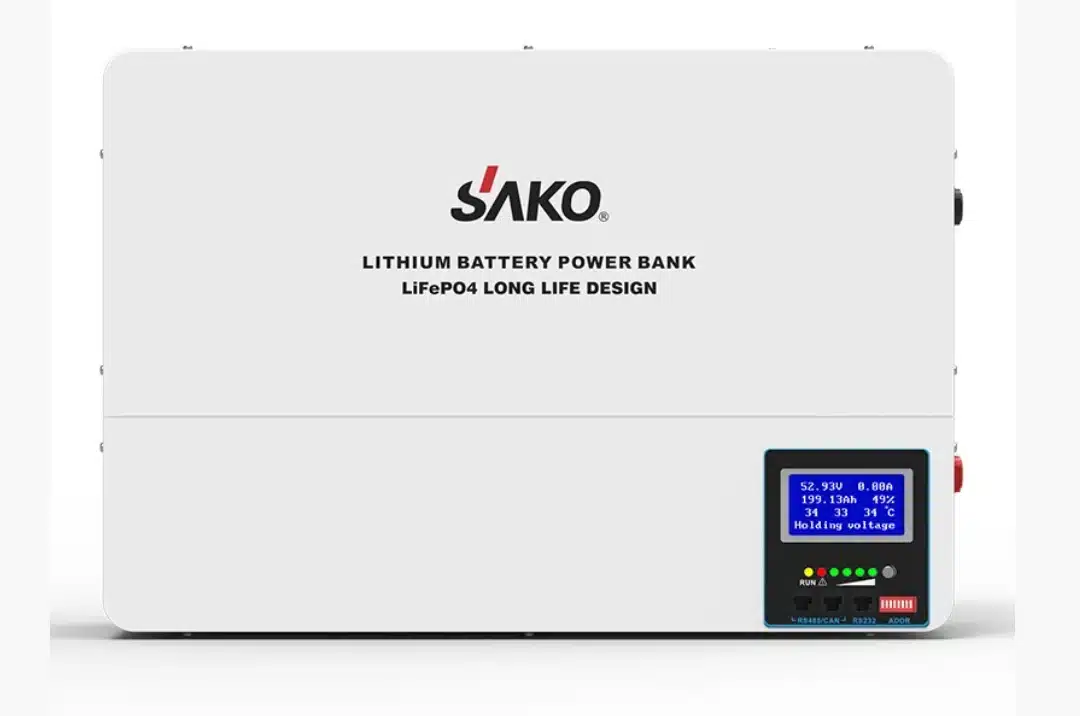
- Ideal for home solar energy storage, especially in off-grid or hybrid systems.
- Delivers 5kWh of energy capacity, with options to scale up to 10kWh depending on configuration.
- Uses LiFePO₄ BYD cells, known for durability and thermal stability.
- Built to last, it has 6,000 life cycles and is backed by a 5–10 year warranty, depending on the seller.
- Compact wall-mounted or stackable design for space-saving installation.
- Offers an IP54/IP20 protection rating, guarding against dust and moderate water exposure.
- It comes with a built-in BMS (Battery Management System) for safe and efficient operation.
- It is compatible with various inverter brands and integrated via CAN and RS-485 communication ports.
- It weighs around 59kg and is housed in a rugged metal body for indoor use.
What to expect if you buy the Sako 10kWh (48 V) lithium battery
- It offers approximately 10kWh of usable energy (48 V, 200 Ah), ideal for full-home backup or hybrid systems; it is listed for around ₦2.5 million in Nigerian markets.
- Utilizes LiFePO₄ (LFP) cells designed for both safety and long lifespan.
- Built for longevity with 6,000 charge cycles.
- Commonly sold in a wall-mountable or floor-friendly form factor, around 80–90 kg in weight.
- Includes smart BMS for protection against overcharge, extreme temperatures, and balancing.
- Equipped with CAN and RS-4855 ports for seamless connection to most solar inverters.
- Rated with IP20–IP54 protection, suitable for indoor use.
- Offers a scalable setup, allowing multiple batteries to connect in parallel.
- Frequently paired with Sako inverters and solar panels in Nigerian installations.
Lithium battery price trends in Nigeria (June 2025)
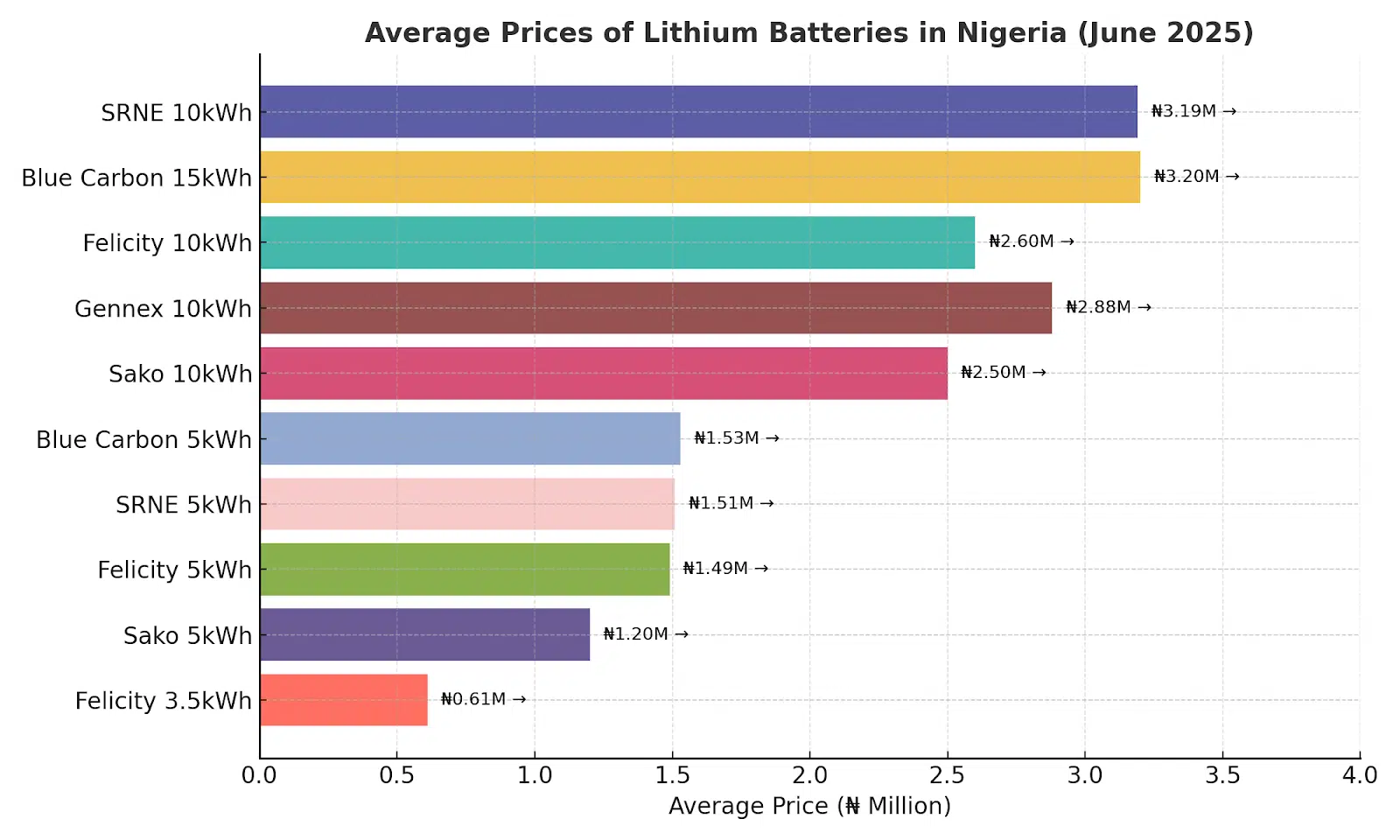
Each bar in the chart represents a battery model — for example, Felicity 5kWh or Blue Carbon 15kWh. The longer the bar, the higher the price.
The numbers along the bottom of the chart (like 0.5, 1.0, 1.5, etc.) represent prices in millions of Naira (₦). Here’s a simple guide:
- 0.5 = ₦500,000
- 1.0 = ₦1,000,000
- 1.5 = ₦1,500,000
- 2.0 = ₦2,000,000
- 2.5 = ₦2,500,000
- 3.0 = ₦3,000,000
- 3.5 = ₦3,500,000
So price-wise, what the charts tell you is that:
- The most affordable battery on the chart is Felicity 3.5kWh, with an average price just above ₦600,000.
- Sako 5kWh is another budget-friendly option, sitting just above ₦1.1 million.
- Sako 10kWh, a higher-capacity option, sits around ₦2.5 million, making it an upper mid-range choice.
- Mid-range batteries include models like Felicity 5kWh, Blue Carbon 5kWh, and SRNE 5kWh, all priced between ₦1.4M and ₦1.7M.
- Batteries like Gennex 10kWh and Felicity 10kWh fall in the upper mid-range, averaging between ₦2.2M and ₦2.9M.
- The most premium batteries are SRNE 10kWh and Blue Carbon 15kWh, with average prices around ₦3.2M to ₦3.3M.
What influences lithium battery prices in Nigeria?
Lithium battery prices in Nigeria vary widely, and is intentional. Here’s why that happens:
Battery capacity (kWh or Ah)
This is one of the biggest price drivers. Batteries with higher capacity (more kilowatt-hours or amp-hours) can store more power and run your appliances longer. But that high capacity means the prices get higher, too. A 10kWh battery stores twice as much energy as a 5kWh battery, so naturally it costs more. However, the cost per kWh usually goes down as capacity increases. In other words, buying bigger may be more cost-efficient if your power needs justify it.
Brand value and market reputation
Some brands are priced higher because of trust, consistency, and customer satisfaction. For example, Felicity Solar and Blue Carbon have earned recognition in Nigeria’s solar market, while brands like Gennex, SRNE, and Sako are growing in popularity due to their mix of affordability and decent performance. Premium brands invest in tech, safety, and quality, and their prices reflect that.
Battery chemistry
The most common and recommended chemistry is LiFePO₄ (Lithium Iron Phosphate), known for safety, long lifespan, and thermal stability. It’s more expensive than older lithium-ion types, but it’s what most quality brands now offer. Cheaper lithium variants may exist, but they usually sacrifice lifespan or safety. Most batteries sold in Nigeria today are LiFePO4 (Lithium Iron Phosphate).
Where you buy (source)
Prices vary depending on whether you buy from the official brand, Jumia, Grecopower, Energymall, Jiji.ng, or direct solar vendors. Direct importers or verified dealers may offer better support, while online shops may run discounts but offer less warranty follow-up. Always check the seller’s credibility.
Warranty & local support
Longer warranties — especially from brands with active reps in Nigeria — often increase the price. A battery with a 5-10 year warranty and solid support is worth more than one with no after-sales assurance.
Exchange rate impact
Almost all lithium batteries are imported. So when the naira loses value against the dollar or yuan, prices shoot up quickly — sometimes within days.
Availability & location
Stock levels and local demand also affect pricing. A 10kWh battery might cost more in a rural area with fewer options than in Lagos or Abuja, where competition drives prices down. Some vendors also temporarily increase prices during high-demand seasons (e.g., fuel scarcity or dry season).
So, weighing these factors carefully can help you understand why you’ll be spending that purchase amount on any lithium batteries of your choice.
How to choose the right lithium battery in Nigeria (Protips)
Picking the right lithium battery is not just about price; it’s about matching the battery to your energy needs, budget, and long-term plans. Here’s how to make the right choice:
Know your energy needs (load calculation)
Start by calculating how much power your household or office uses daily. A 5kWh battery may be enough for lights, fans, and a fridge, but won’t handle heavy appliances like ACs or deep freezers. If unsure, work with a solar installer or electrician to measure your daily load in kWh.
Once you know your load, choose a battery with at least 20–30% more capacity than your daily use. This allows for energy loss and ensures the battery isn’t constantly drained, which improves its lifespan. For example, if your home uses 4kWh daily, a 5kWh or 6kWh battery is ideal.
Choose LiFePO₄ for safety & lifespan
If budget allows, always go for LiFePO₄ chemistry. It’s more durable, safer, and can last 3,000–6,000 cycles. That’s several years of daily use with minimal degradation.
Don’t ignore warranty and support
Look for brands that offer at least a 3–5-year warranty and have Nigerian-based support or resellers. This protects your investment in case of faults or maintenance needs.
Buy from verified sellers
Always buy from reliable sources like Energymall, Jumia Verified Sellers, or Grecopower. If buying on Jiji or through importers, ensure the seller has good reviews or a physical store.
Balance price and performance
Sometimes, a ₦1.8M battery will serve better long-term than a ₦1.3M one with poor warranty or weak backup. Always compare cost per kWh, build quality, and brand trust.
Remember these tips before you finalize your buying deals, will serve you better. They’re sure paths to getting the right cash value and the product you need.
Rounding up,
Shopping for lithium batteries in Nigeria isn’t always straightforward. Prices shift, sellers vary, and there’s no one-size-fits-all option. But once you step back and size things up, the serious options begin to separate themselves.
If you’re running basic appliances ( that’s lights, fans, maybe a small fridge), a 5kWh battery will do the job. And if you decide to go for 10kWh or more, that’s when you’re powering larger homes or offices. Brands like Felicity, Blue Carbon, and Gennex show up again and again for a reason: They offer solid performance and visible local support.
While places like Jiji, Energymall, and Jumia offer different deals, the key is to know your load, check the warranty, and confirm prices before you buy.
At the end of the day, the best battery isn’t always the most expensive one; it’s the one that fits your setup and your pocket and gives you peace of mind when PHCN goes dark. Take charge!
Frequently Asked Questions (FAQs) about lithium batteries in Nigeria
- What makes lithium batteries better than traditional lead-acid batteries for solar power in Nigeria?
- Lithium batteries, especially LiFePO4 types, offer higher energy density, longer lifespan (often 5+ years compared to 2-3 years for lead-acid), faster charging, and require minimal maintenance. They also have a deeper depth of discharge (up to 80%), meaning more usable energy per cycle.
Unlike lead-acid batteries, lithium batteries are safer, have built-in thermal management, and do not emit harmful gases. This makes them ideal for Nigerian homes and businesses relying on solar inverters.
- Are lithium batteries safe to use in Nigeria’s climate and power conditions?
- Yes. Modern lithium batteries, particularly Lithium Iron Phosphate (LiFePO4), are designed with advanced Battery Management Systems (BMS) that monitor temperature, voltage, and current to prevent overheating and overcharging.
LiFePO4 chemistry is thermally stable and less prone to fire risks than other lithium-ion types. However, proper installation, ventilation, and the use of quality, certified batteries are crucial to ensure safety in Nigeria’s hot and humid climate.
- What maintenance do lithium batteries require in Nigerian conditions?
- Lithium batteries require minimal maintenance compared to lead-acid types. However, to maximize lifespan, keep terminals clean and dry, avoid deep discharges below recommended levels, and ensure proper ventilation to prevent overheating in Nigeria’s hot climate. Regularly check the Battery Management System (BMS) alerts if available. Avoid exposing batteries to direct sunlight or moisture to maintain optimal performance.
- Why are lithium batteries more expensive upfront, and are they worth the cost?
- Lithium batteries have a higher initial cost compared to lead-acid batteries due to advanced materials, technology, and longer lifespan. However, they offer better efficiency, require less maintenance, and last 3-5 times longer, resulting in lower total cost of ownership over time. Their fast charging and deeper discharge capabilities make them a cost-effective investment for Nigerian users seeking reliable power.
- How does the Nigerian Naira exchange rate affect lithium battery prices?
- Since most lithium batteries are imported, fluctuations in the Nigerian Naira against the US Dollar significantly impact prices. A weaker Naira increases import costs due to higher dollar-denominated prices, shipping, and duties, leading to higher retail prices.
This currency volatility causes price fluctuations in the Nigerian market, making it essential for buyers to strategically compare prices across multiple sources and time purchases.
- Can lithium batteries be recycled or safely disposed of in Nigeria?
- Currently, Nigeria lacks formal recycling infrastructure for lithium-ion batteries, posing environmental and safety challenges. Improper disposal can lead to toxic chemical leaks and fire hazards. Studies emphasize the need for responsible end-of-life management, including collection systems and environmentally sound recycling solutions. Initiatives like e-waste compensation schemes are being explored to develop sustainable lithium battery recycling in Nigeria.
- Are lithium batteries compatible with all solar inverters used in Nigeria?
- Most modern solar inverters support lithium batteries, but compatibility depends on the inverter’s specifications and battery management system. Hybrid inverters designed for lithium batteries optimize charging and discharging cycles. Verifying compatibility with the inverter manufacturer is important to avoid performance issues or damage.
- How can I identify counterfeit lithium batteries in Nigeria?
- Counterfeit lithium batteries are a growing problem in Nigeria’s market. To avoid them, always buy from reputable dealers or official distributors. Check for proper certification labels such as SONCAP, verify warranty documents, inspect the battery’s physical quality, look for clear branding, consistent labeling, and quality

